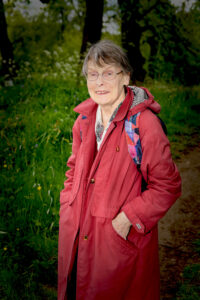Mary McCann, born in Kilmarnock and raised in Saltcoats before pursuing her studies in Glasgow, has been deeply involved in traditional music and culture for many years. Her journey began in the mid-nineties when she joined an ALP Scots Music Group class taught by Eileen Penman. Through workshops and trad song gatherings, Mary discovered influential source singers like Jeannie Robertson, Sheila Stewart, and Lizzie Higgins, as well as prominent figures from the folk revival such as Sheena Wellington, Gordeanna McCulloch, Margaret Bennett, and Jimmy Hutchison. Inspired by these artists, Mary started writing her own songs and actively participated in the TMSA trad singing competitions, gaining valuable experience and knowledge along the way.
In 1998, Mary embarked on community song leading at the Gilmerton Community Centre and later continued this role at ALP Scots Music Group with the guidance and training provided by Stan Reeves and the tutor training program. She also initiated daytime singing groups, enjoying the opportunity to meet and collaborate with older singers who possessed a vast repertoire of songs and a shared passion for Scots songs and language. Additionally, Mary established Cafe Ceilidh at the Scottish Storytelling Centre, providing a space for SMG students to host informal sessions.
Mary’s pursuit of growth in her craft led her to attend voice workshops with Franki Armstrong and songleaders workshops with Ali Burns. She also became an active member of the Sangstream Scots Folk choir for several years. Demonstrating her dedication to the traditional music community, Mary volunteered at SMG, leading workshops on various topics such as Midwinter Songs, Lullabies, and Burns songs. With the help of Helen Reid in the SMG office, she incorporated students’ suggestions and assistance to create three session songbooks. Mary expresses deep gratitude to SMG for being an inspiring organisation that brings joy to many people and has provided her with numerous rewarding experiences through classes and workshops.
While growing up, Mary had the privilege of being surrounded by a family of talented singers who frequently performed a diverse range of songs at family gatherings. Their repertoire included Irish trad, Burns songs, music hall tunes, popular songs, Latin hymns, Songs of the Isles, Stephen Foster songs, and songs from films. Her father also introduced her and her siblings to Gregorian chant and Irish songs, and they learned folksongs from the British Isles at school. As a teenager, Mary enjoyed singing skiffle, rock ‘n’ roll, American folk songs, and pop songs with her friends. She was also exposed to jazz, Paul Robeson, and the Clancy Brothers. As an adult, her musical interests expanded to include artists like Simon and Garfunkel, the Beatles, jazz, and some classical music.
Reflecting on the evolution of the Scottish music scene since her involvement, Mary acknowledges several changes. There has been a rise in community choirs that embrace a broad repertoire, often incorporating Scots songs. The number of bands and the emergence of exceptional young musicians and singers have also contributed to the scene’s growth and professionalism. However, Mary recognises the loss of older tradition bearers and many outstanding singers and songwriters. She expresses concern about the trend of people relying on their phones for song lyrics instead of learning the songs by heart. Mary also laments the closure of notable publications such as the Living Tradition magazine and Coda Record shop. On a positive note, she highlights the success of events like Celtic Connections and the Young Trad awards, which have elevated the profile of Scottish music in the media. Mary is delighted that radio shows like Travelling Folk and Take the Floor continue to thrive. Despite the challenges faced by some folk clubs, sessions, and trad singing festivals/weekends due to an aging membership, Mary emphasises her belief in the importance of grassroots efforts and community-oriented song.
In her work within Scottish music and culture, Mary finds joy in connecting with people of all ages through songs that resonate with shared experiences or address important topics. She appreciates the deeper meaning of traditional music compared to popular music, particularly as she grows older and gains a deeper appreciation for her own Irish and Scottish traditions and the people and events that came before her. Mary values the participatory nature of Scottish music, where people love to join in and experience a wide emotional range of songs, from humorous tunes to tragic ballads, love songs, lullabies, and protest songs.
Working in Scottish music and culture allows Mary to utilise and develop her natural voice while enjoying the social aspects and positive impact on people’s well-being. She has developed a strong affinity for the Scots language, writing songs in Scots and undertaking translations. Mary finds that people love discussing Scots words and enjoy singing in Scots. She also aims to perform songs at informal gatherings and social events.
Looking to the future, Mary plans to continue her songwriting journey and release more songs for people to enjoy and sing. She intends to carry on organising Song Gatherings for SMG as long as she is able and will maintain the Daytime Session Group she currently hosts. Mary also has aspirations to create more songbooks.
In conclusion, Mary McCann’s deep involvement in Scottish music and culture has allowed her to connect with people of all ages through shared songs and traditions. She is driven by a passion for preserving and promoting traditional music, while also embracing new developments in the scene. Mary’s contributions as a songwriter, singer, community leader, and volunteer have enriched the Scottish music community and continue to inspire those around her.
